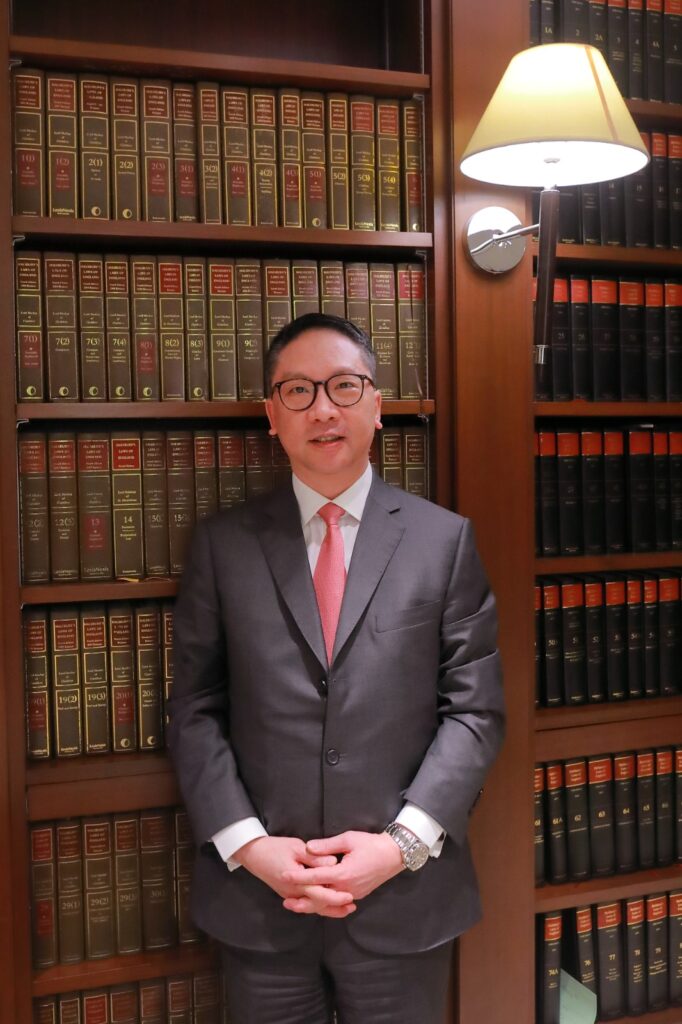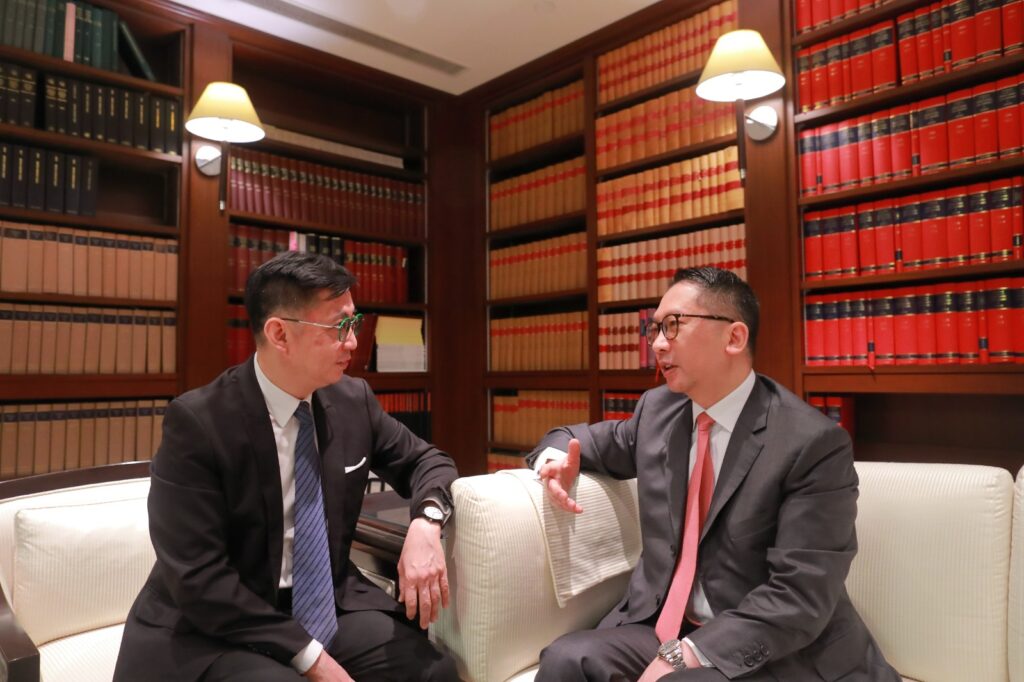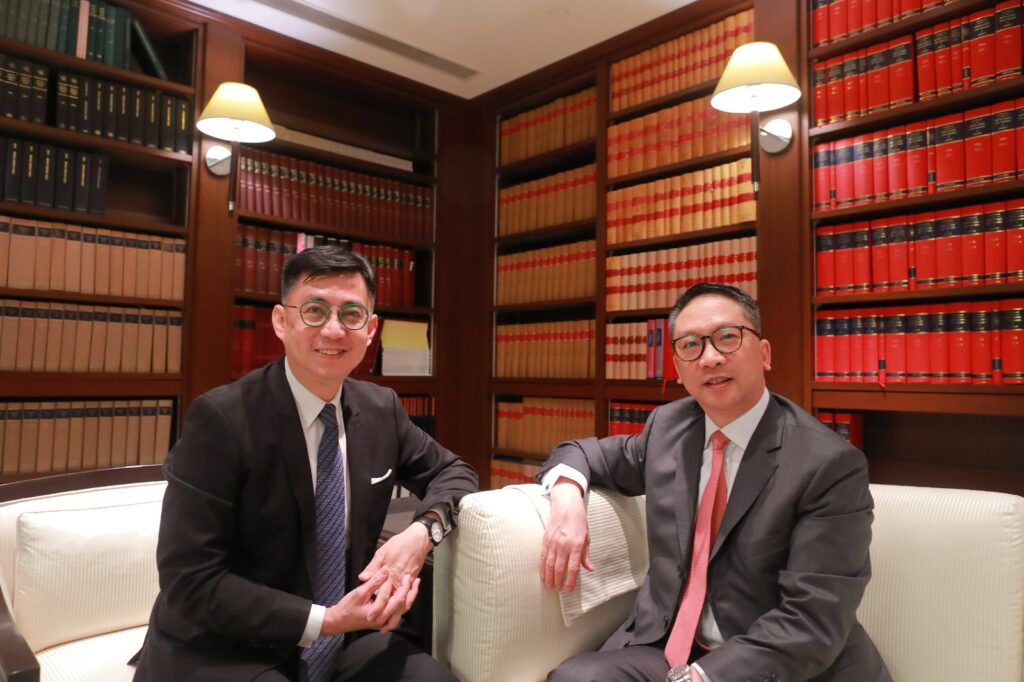Mr Rimsky Yuen GBM SC JP was appointed as the Secretary for Justice of the Hong Kong Special Administrative Region Government (“Hong Kong Government”) on 1 July 2012.
Prior to July 2012, Rimsky practised as a barrister primarily in different areas of commercial law. Apart from acting as advocate in court or arbitral proceedings, he also from time to time acted as arbitrator in international arbitration and as mediator in commercial and other civil disputes.
During the period from 1 July 2012 to 5 January 2018, Rimsky was Secretary for Justice of the Hong Kong Government overseeing different areas of works including the promotion of arbitration and mediation. With Rimsky at the helm, the Department of Justice of the Hong Kong Government took initiatives to consult the public on the possible enactment of a piece of apology legislation. The Apology Ordinance, which is the first piece of apology legislation in Asia, was enacted in July 2017 and came into effect on 1 December 2017. After his resignation as Secretary for Justice in January 2018, Rimsky resumed private practice at Temple Chambers as barrister, arbitrator and mediator specializing in commercial disputes. Since then, he has been appointed as arbitrator in various international arbitrations (both Hong Kong and overseas) and has also been retained as advising counsel or advocate in various commercial disputes. He is currently a Co-Chair of the Hong Kong International Arbitration Centre (“HKIAC”), the Chairman of the Hong Kong Mediation Accreditation Association Ltd (“HKMAAL”), and a Member of the International Commercial Expert Committee of the International Commercial Court of the Supreme People’s Court, the PRC.

TK: Shall we start with the Apology Ordinance? I still remember the telephone conversation that we had when you asked me to join the apology legislation working group. Please share with our readers the idea of having a piece of apology legislation in Hong Kong and your thoughts on it as of today.
Rimsky: The idea of exploring the need of an apology legislation first came to my mind when I was chairing the working group on mediation legislation which eventually led to the introduction of the Mediation Ordinance in Hong Kong. At that time, we looked into the pros and cons of having a stand-alone apology legislation and the experience in other jurisdictions.
After I took up the role of Secretary for Justice, I started to consider the steps that we need to take to further enhance the legislative framework of Hong Kong to maintain her status as a dispute resolution centre in the Asia Pacific region. One of the steps that I believe desirable and that I took was to explore the idea of having an apology legislation for Hong Kong. That’s the reason why a working group was set up to look into the desirability of having an apology legislation. With the able assistance of people like you, the study and consultation were completed and the answer was clear. As experience in other jurisdictions shows, an apology legislation can be of great assistance in the conduct and promotion of mediation. Among others, the desirability of having an apology legislation in the context of medical negligence and similar cases is very clear. Accordingly, the Department of Justice took the lead to introduce the Apology Ordinance.
Looking back, I’m glad that we have introduced the Apology Ordinance. The feedback from the mediation community is very positive. Besides, it can show to the international community that Hong Kong takes dispute resolution including mediation and related matters seriously and that we would introduce the requisite legislation as and when it is necessary or desirable to do so.
TK: Please tell our mainland and overseas friends more about HKMAAL and your role as its chairman. How HKMAAL will position itself as we may soon have Greater Bay Area mediators?
Rimsky: When Hong Kong started to promote mediation at around the time the Civil Justice Reform was rolled out, one of the issues was how to ensure the quality and professionalism of our mediators. It is against this background that that question of accreditation was studied and also the background which led to the setting up of HKMAAL. The founding members of HKMAAL are the Law Society of Hong Kong, the Hong Kong Bar Association, the Hong Kong Mediation Centre and the HKIAC. HKMAAL was and still is intended to be the premium accreditation body which sets the yardsticks for accreditation for both general meditators and also family mediators. Since its setting up, HKMAAL is the largest mediation accreditation body in Hong Kong.
Like Hong Kong, HKMAAL has to look beyond the boundary of Hong Kong. On the one hand, it has to stay connected with the international mediation community. On the other hand, it also has to enhance exchanges and interflow with the mediation community in Mainland China. The Greater Bay Area is a fast-developing area and an area with great potential in terms of demand for dispute resolution services including mediation. HKMAAL can share its experience with its counterparts in the Greater Bay Area as well as provide services to end-users of mediation services in the Greater Bay Area. In short, HKMAAL stands ready to develop a close working relationship with the stakeholders in the Greater Bay Area.

TK: You are one of the co-chairs of HKIAC. Why HKIAC has a co-chair system? What role HKIAC will play in the promotion of mediation in Hong Kong and in the region?
Rimsky: HKIAC adopts the co-chair system partly because of the workload and partly to enhance its international characteristics. It’s a new attempt and so far the co-chair system works well.
HKIAC supports both arbitration and mediation. Indeed, as early as in January 1994, the Hong Kong Mediation Council (previously known as the Mediation Interest Group) was set up within HKIAC for the purpose of promoting the development and use of mediation as a means of resolving disputes. From time to time, the Hong Kong Mediation Council holds seminars and meetings on different aspects of mediation and also organizes training courses relating to mediation.
Mediation and arbitration have close relationship. This is reflected by the provisions concerning med-arb in our Arbitration Ordinance. Besides, with the growing popularity of multi-tier or staged dispute resolution clauses or mechanisms, HKIAC will continue to support the development of mediation in Hong Kong.
TK: You started your legal career as a barrister in 1987 and you were appointed as a senior counsel in 2003. Now, you practise as an advocate in court and arbitral proceedings, sit as an arbitrator and also mediate disputes. How do you manage your time? On a personal level, do you have a preferred way of resolving disputes?
Rimsky: I enjoy practising as advocate, mediator and arbitrator. It enables me to see issues from different angles. That’s why I endeavour to maintain a mixed practice in that sense.
I do not have any preferred way of resolving disputes. I think there is no one-size-fits-all solution in the context of dispute resolution. Nor do I think one can say one form of dispute resolution is necessarily better than another form. Different disputes and different situations call for different means of dispute resolution. Ideally, a dispute practitioner should possess at least the basic skills of different means of dispute resolution so that appropriate advice can be given to one’s clients. From the perspective of end-users, different means of dispute resolution are like different instruments. Which instrument is most appropriate to do a job depends on the circumstances, and the same is true to dispute resolution.
TK: Imagine we were in front of a group of law students. What advice would you share with those who look up to you as a role model?
Rimsky: First of all, I don’t think I can be a role model. I’m just one of the barristers and dispute resolution practitioners in Hong Kong. It’s just that I am lucky to have the opportunities to participate in the development of mediation and arbitration in Hong Kong. I very much treasure those experiences that I have the opportunities to learn from different people with very different backgrounds.
For members of the younger generation, I would suggest that they should acquire and maintain an international perspective. The international dispute resolution landscape evolves and changes constantly. It is very important to keep abreast of international development so as to keep up-to-date. Besides, one of the strengths of Hong Kong is its international dimension. Hong Kong would not be the same if it were not an international city. Hence, to preserve our strength, we need to have an international vision and international experience. Attending international conferences or participating in similar activities is one of the ways to learn from the experience of overseas counterparts, and thus a way to broaden one’s horizon.
Besides, I guess I don’t need to stress that technological development is another aspect that one can ill afford to ignore as it impacts on all aspects of our life including dispute resolution.
TK: Rimsky, thank you so much for your most enlightening and inspiring sharing. I am confident that this interview will benefit not only those who are interested to know more about the Hong Kong ADR landscape but also persons who are keen to learn from a legal and ADR practitioner with impeccable credentials.

________________________
To make sure you do not miss out on regular updates from the Kluwer Mediation Blog, please subscribe here.


